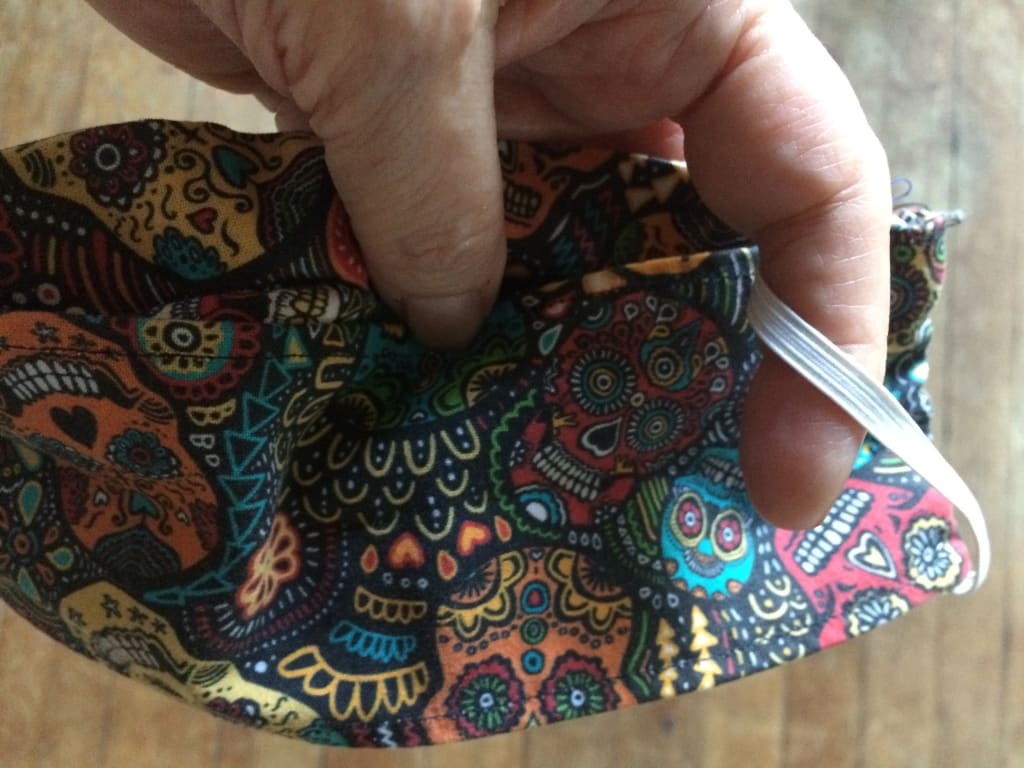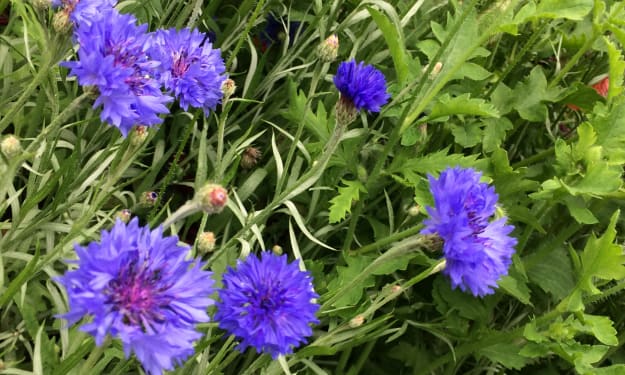Clean Earth
After It's Over

Clean Earth
This morning Sophie, half asleep, roused as usual by the yowling of Keith the cat, enters the kitchen of her apartment. It’s just another morning until she startles, feeling stings, little pinpricks, on her feet and up her ankles. She looks down.
At first she sees only movement. Then she makes out myriad tiny brown ants swarming, spiraling around a piece of cooked elbow macaroni on the floor.
It shocks her to see so many ants. Where did they come from? One ant carrying, say, a grain of sugar, would be interesting, but this is an infestation.
Keith regards the ants, paws at them tentatively. Sophie wets a cotton dish rag under the faucet and removes the piece of macaroni, wiping up at the same time a swath of ants. Almost instantaneously, all the rest disappear. Where did they go? Into the cracks between the floorboards? It is an old wooden floor. The spaces between the boards are not wide, but wide enough for tiny ants, apparently.
Keith stares fixedly at Sophie until she takes a bag of cat food from the stash of canned goods and kibble in the pantry cupboard and feeds him.
Sophie took in Keith last fall when he was a kitten, sick, wet and helpless, mewling in the sleety rain outside her building. Years ago, most people had their cats neutered and kept them inside. Now feral cats prowl the neighborhood and dogs run rampant. Well, that’s to be expected; their owners have died.
Black death, yellow fever, smallpox, polio, Asian flu, Spanish flu, Zika, COVID…throughout history, plagues and pandemics have caused suffering and grief. After the scientists defeated COVID, the world rejoiced.
The celebration was short-lived. Various mutations of COVID came back with a vengeance, and one fatal disease after another has followed in quick succession, viral, bacterial and cancerous. No one knows why, although there are plenty of theories. The immunologists can’t keep up. The medical profession can’t keep up. People are dying like flies.
“No,” Sophie tells Keith, “worse than that, because the flies are doing very well, thank you.” She talks to Keith a lot. She rinses the cotton rag in the sink, washing the vanquished ants down the drain--it’s no use trying to find paper towels, the hoarders have bought them up--wrings it out and hangs it over the faucet.
Styles have not changed much in the last few years. Sophie remembers when fads in consumer goods changed season to season, year to year. She dresses in jeans and a white blouse, puts on a simple cloth mask of a type ubiquitous since the early COVID days, hand-sewn by her mother, Lin, and goes out, down the rusting fire escape. Her potted plants, a red-flowered geranium and a sweet-smelling calamondin orange tree, bloom on the wrought iron balcony. Morning glory vines, Heavenly Blue, twine around the handrail. It is a beautiful summer day.
She lives in a university town in a building constructed in the 19th century by masonry workers just off the boat from Italy. Continuous rows of red brick storefronts line both sides of three downtown streets. For 150 years businesses occupied the street level, while the shopkeepers typically lived upstairs.
Sophie remembers the town when it was busy with traffic, shoppers, students, when the business downstairs was a music store where she and her friend Julie used to hang out. The music store is boarded up now, and Sophie has the building all to herself. Somehow she still has electricity, but she hasn’t been billed in months; no one comes to check the meter. She no longer even has a landlord. Sam Murphy, the man who used to own the building, is dead.
On her way to work Sophie passes a grocery, a bar and a boutique, all empty. Abandoned cars, long since scavenged, fall to pieces here and there along the curb. The university is still open, on a restricted basis, and she still has a part-time job at the graduate library. Life is lonely these days, but she knows that in some ways she is lucky.
Also, Sophie knows that in some ways she is childish. Her experience growing up was not normal. People were kept apart from each other, no hugging, no touching, because of the ever-present fear of disease. Not like when her mother, Lin, was young. Lin said that people used to say, If it feels good, do it!
When the new diseases took hold, herbalist healers, religious cultists, teen-age gangs and crazed shooters proliferated. Television news anchors, trying to appear calm, became hysterical. After that the television screens went blank.
And yet there still were some wild ones who refused to mask, who said, what the hell, you gotta go some time. Revelers.
Julie used to be a reveler, to a degree.
In their student days, Sophie and Julie drank wine and danced, danced to music old and new. Danced to Aretha Franklin, “We going riding on the freeway of love in my pink Cadillac.” Laughed. Talked about everything, and laughed. Laughter was the great thing. Laughed until they fell over onto Julie’s futon. Drank, talked, danced, laughed more.
Sophie and Julie were friends when Jerome first appeared on the scene.
Jerome was part of their group, but Julie never liked him.
“Jerome wants to save the Earth,” Sophie said. “He’s working on his doctorate in earth science.”
“Jerome is a zealot,” Julie said.
Sophia and Julia laughed together at Jerome’s presumption, his ridiculous over-confident attempts at seduction. But, Sophie told Julie, “ the first time his fingers brushed my wrist, I swear to God, It was like electricity. My hands began to shake.” She couldn’t understand why. “I don’t even like him,” she said, and she meant it.
Jerome disappears for weeks or months at a time, then returns without explanation. It is his way. Sophie doesn’t think about him much when he’s gone.
The graduate library had been understaffed For a long time, and employees hadn’t gone upstairs in a while. A young woman had been living up in the stacks, no telling how long. About a year ago, Sophia found her body downstairs near the front door. She must have died in the night. A policeman came and found some tatty clothes and a few belongings, just odds and ends, upstairs. Sophie found a gold locket holding two tiny photographs carefully cut out--with nail scissors?--to fit inside, one of a young man and the other of a little bald baby. The chain was gold as well, very thin and fine.
“But why are you crying?” Jerome asked Sophie later. “You didn’t even know this woman. She was just a vagrant, an illegal. And why didn’t you keep the damn locket, it was probably 18 karat, it was probably worth something.”
“I don’t know,” Sophie said, weeping, and in truth she didn’t. It seemed she went on, day after day, not feeling anything, and then something like this would strike her out of the blue and break her heart.
“Why didn’t you and your husband have children?” Jerome once asked.
“Gill and I were so young. We hadn’t thought about it yet.”
Jerome smiled. “When you talk about Gill, I always think of a fish.”
“Gill is not the name of a fish.”
“Part of a fish, then.”
Sophie and her brother Robbie used to talk and talk.
“Robbie said, what if intelligent aliens could look at Earth,” Sophie told Jerome. “Aliens would see how people are overpopulating the planet and polluting Earth’s atmosphere and they’d figure that humans are a cancer.”
“Robbie said that?” Jerome asked.
“Yes. And how humans were zipping off to other planets the way microbes spread disease throughout an organism.”
“Robbie said that?” Jerome asked again, incredulous.
“Yes,” Sophie said. “We were just kids talking. Didn’t you ever lie in the grass on a summer night and look up at the stars and wonder who or what was up there?”
“Oh, sure,” Jerome said, “of course, all kids do that at some point.” He sounded relieved.
It was May, Lin’s favorite time of year. The fruit trees were flowering. Petals floated in the air. Sophie was cutting lilac branches, filling Lin’s arms with flower trusses, purple and white. The scent of lilacs was so thick, so sensual, Sophie felt faint.
“I can’t smell them,” Lin said, puzzled. Disturbed. She fell ill next day and hasn’t felt well since. It’s been two months.
Jerome told Sophie he has been working with the CEI, the Clean Earth Initiative, for a long time. Humans are an aberration, humans are killing the planet.
“Just because you have a PhD, Jerome, that doesn’t mean you know everything.”
“I have two PhDs, actually.”
“Oh, excuse me, Dr. Dr. Jerome.”
“The CEI is an organization of environmentalist scientists,” Jerome told her. “Did you believe COVID came from a wet market in China or from a Chinese lab? Do you think all of these diseases came from space aliens? Or Russians? or Iranians? No, this is our work, the work of CEI. It is possible to reduce the population of humans on Earth and start over, with a small, select group. Cleanse the planet. Some of us will be saved. That’s what the Clean Earth Initiative is about.”
“Well, the CEI isn’t God. You’re not God, Jerome.”
“Whatever,” Jerome said equably.
Now that Jerome has told her about his Clean Earth Initiative she has almost become used to it. He comes up behind her at the library as she is shelving books and puts his arm around her.
“Don’t you realize, Sophie,” he says, “that you and I are the only ones here? When was the last time you got a paycheck in the mail? Or anything in the mail? When was the last time the bank was open? When was the last time the Internet was up? It’s kind of sweet seeing you dusting and shelving here as if nothing has changed, but you’re in denial. It’s over. You can’t stay here for the winter. Come with me. You’re only 28. We’ll have a baby.”
“Jerome--are you in love with me?”
“It’s not about that.”
“I can’t leave Lin.”
“Well, anyway, your mother won’t last much longer.”
“And what if I don’t come with you? she asks. "Will you kill me? Or will you just let me go Clean Earth?”
Jerome pulls back a little, looks surprised. “Oh, Sophie,” he says, “you know it’s nothing personal.”
After work she walks the four blocks to Lin’s little wooden house and lets herself in with a key. Her mother is lying down.
“You must miss Gill,” Lin says after supper. Her breathing is raspy. Sophie is sitting on a chair by the bed.
“Yes. I loved him. I always will. I miss Robbie too. And Julie. So many deaths.”
“What about Jerome?”
“I think Jerome may well be insane. Why am I attracted to him? I don’t even respect him. It makes me hate myself.”
Sophie waits to hear what her mother will say, wanting to know, but Lin has fallen asleep. The rasping has quieted, and Sophie, worried, reaches over to put a hand on Lin’s chest to feel whether she is breathing. She is. The room grows still and dim.
All the lights from all the cities of Earth, viewed from space--you could see it as beauty, or you could see it as infestation, as disease. Anyway, Sophie thinks, there are fewer lights now. The cities are going dark.
She gets up and walks over to the window. The first star of the evening looks back at her from somewhere in the universe, impossibly far away.





Comments
There are no comments for this story
Be the first to respond and start the conversation.